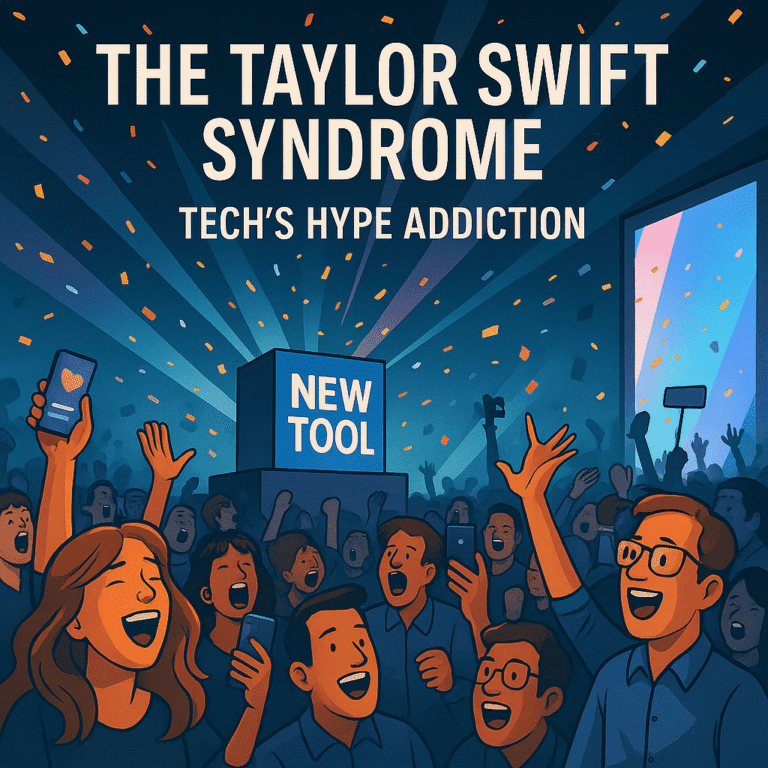The tech industry needs to stop acting like teenage girls at a Taylor Swift concert. A new framework drops? “This changes everything.” OpenAI releases an update? “It’s the future of work.” Apple glues a screen to your face? “Revolutionary.”
No, it’s not. Calm the hell down.
This obsession with treating every incremental improvement like the second coming of sliced bread isn’t just exhausting, it’s stupid. It erodes credibility, kills critical thinking, and makes real progress harder to spot. We’ve trained an entire generation of builders and buyers to confuse novelty with significance. And it shows.
We’ve got LinkedIn flooded with “thought leaders” shouting about how XYZ tool “unlocked their productivity” or “completely changed their perspective on workflow automation.” Spoiler: it’s just a slightly prettier to-do list with an OpenAI wrapper. You’re not witnessing the birth of AGI. You’re watching someone automate busywork and overstate it for clout.
This isn’t innovation. It’s dopamine-driven overreaction.
The people building serious systems aren’t the ones screaming “game-changer” every 48 hours. They’re busy evaluating tools for edge cases, comparing latency, checking context handling, mapping costs per 1K tokens, and deciding whether it fits into a pipeline without breaking everything else. Boring? Maybe. Effective? Absolutely.
But nuance doesn’t trend on TikTok.
And that’s the problem. The tech world’s discourse is increasingly shaped by the same psychological machinery that fuels pop fandoms: hype, tribalism, aesthetic worship, and influencer mimicry. And while that might sell courses and get likes, it’s terrible for decision-making.
Let’s be clear: not every tool is worth switching for. Not every feature is worth tweeting. Not every announcement is worth hyperventilating over. Most of it is iterative, and iteration is fine. That’s how real things improve. Quietly. Incrementally. Without pyrotechnics.
And no, Apple, your VR headset doesn’t “change everything”. It’s not the next internet. It’s not the new laptop. It’s a spatial iPad strapped to your skull. We’ve seen this cycle before: breathless launch, influencer hysteria, overpriced dev kits, and then silence when no one uses it past month three.
Let’s review the graveyard
And this isn’t new. We’ve been here before. Multiple times.
Remember Web3? That was supposed to “decentralize everything.” All it did was decentralize your money into someone else’s rugpull. DAOs, token gating, “owning your identity” – all marketing. The actual use case? Trading monkey pictures and paying $87 in gas fees to click a button.
Or Clubhouse. Remember when that was the future of audio-first social networking? Now it’s a ghost town. Every VC on Earth piled into it, and within 12 months it went from “game-changer” to “what’s that app again?”
NFTs? “The next phase of digital ownership.” Sure, if by “ownership” you mean JPEG speculation tied to Discord drama and speculative collapse.
Google Glass, Magic Leap, Ello, Yo?
All launched with glowing headlines. All “changed everything.” None actually did.
Meanwhile, boring things like Redis, PostgreSQL, and Node.js just kept quietly running half the internet.
I know it’s radical
Here’s a radical idea: Let’s normalize not giving a shit until a tool proves itself in the wild. Not in demos. Not in controlled benchmarks. In real workflows. Under load. At scale.
That means:
- Waiting six months before calling it a “paradigm shift”
- Watching for integration friction
- Testing fallback behavior
- Asking what it replaces without introducing five new problems
Because if you’re switching tools every week because “this one’s different,” you’re not agile. You’re flaky. You’re chasing the high of new tech, not solving problems. You’ve got the attention span of a dopamine addict and the strategic depth of a TikTok trend. To quote Taylor: “You need to calm down“.
You don’t need to be the first to adopt every tool. You don’t need hype. You need uptime. You need to be the first to make it work reliably. There’s a difference. And one of those is bankable.
Let’s grow up.

